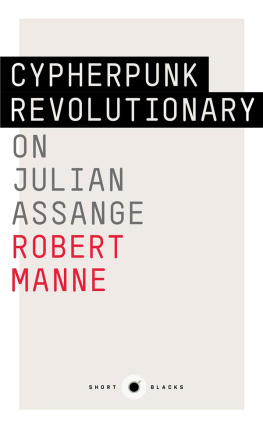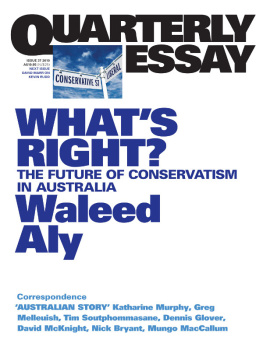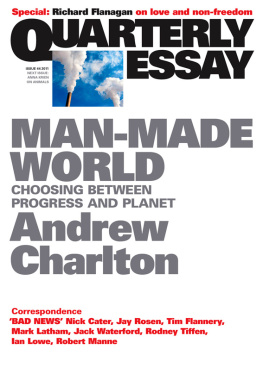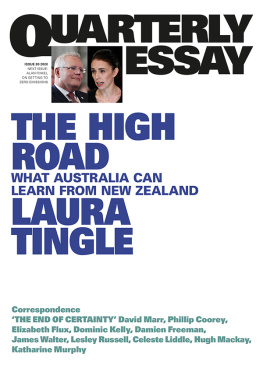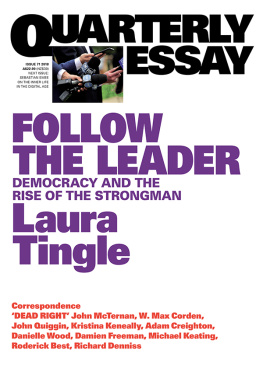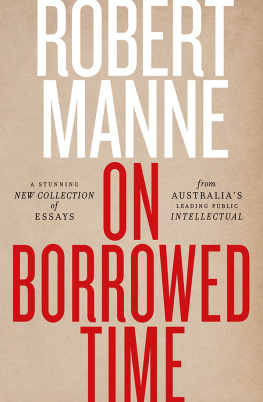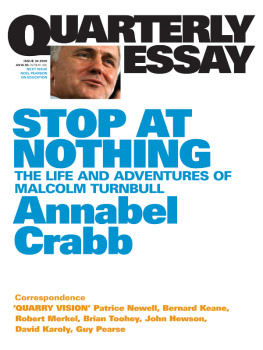Quarterly Essay is published four times a year by
Black Inc., an imprint of Schwartz Publishing Pty
Ltd. Publisher: Morry Schwartz.
ISBN 9781863951593 ISSN 1832-0953
ALL RIGHTS RESERVED.
No part of this publication may be reproduced, stored in a retrieval system, or transmitted in any form by any means electronic, mechanical, photocopying, recording or otherwise without the prior consent of the publishers.
Essay & correspondence retained by the authors.
Subscriptions 1 year (4 issues): $49 within Australia incl. GST. Outside Australia $79. 2 years (8 issues): $95 within Australia incl. GST. Outside Australia $155. Payment may be made by Mastercard, Visa or Bankcard, or by cheque made out to Schwartz Publishing. Payment includes postage and handling.
To subscribe, fill out and post the subscription card, or subscribe online at:
www.quarterlyessay.com
Correspondence and subscriptions should be addressed to the Editor at:
Black Inc. Level 5, 289 Flinders Lane
Melbourne VIC 3000 Australia
Phone: 61 3 9654 2000 / Fax: 61 3 9654 2290
Email:
quarterlyessay@blackincbooks.com (editorial)
subscribe@blackincbooks.com (subscriptions)
Editor: Chris Feik / Management: Sophy Williams
Publicity: Anna Lensky / Design: Guy Mirabella
Production Coordinator: Caitlin Yates
Printed in Australia by Griffin Press.
Quarterly Essay is printed entirely on FSC-certified stock. The Forest Stewardship Council promotes environmentally appropriate, socially beneficial and economically viable management of the worlds forests. For more information on FSC, please visit www.fscaustralia.org.
LOVE &
MONEY
The Family and
the Free Market
Anne Manne
A princely marriage, observed the nineteenth-century essayist Walter Bagehot, is a brilliant edition of a universal fact, and as such it rivets mankind. In the modern era, a political marriage is likely to interest us more than a princely one. While the royal family continues richly to reward us with the diverting antics of unemployed youths, retired grandmothers and wannabe princesses, it more resembles an exotic and morally chaotic soap opera sex, infidelity and death than offers a model for ordinary life. Unsurprisingly, then, we are more than ever likely to turn to our prominent political families as one guide the brilliant edition to contemporary relationships between men and women.
After Kevin Rudd won the leadership of the Australian Labor Party, it was not long before the nations attention turned to his marriage with Therese Rein. As with John and Janette Howard, it was clear that this was a very strong partnership. However, if the Howards represented the old family model of breadwinner husband and homemaker wife, Kevin and Therese seemed to represent the new version: the dual-career power couple. Rein is an immensely successful businesswoman, whose enterprise, in helping the long-term unemployed, had developed from a two-person operation to a multi-million-dollar global business. The transition from the old to the new inhabitants of the Lodge quickly came to stand for more than a mere change of personnel. It was symbolic of the modernisation of the Australian family.
A politician must interest us to be successful. The mild-mannered, bespectacled man who self-deprecatingly called himself an unemployed diplomat held our attention. Kevin Rudd first interested me when I saw him tripping the light fantastic doing the rumba with Kerri-Anne Kennerley on her morning show. I immediately thought: he might win the next election. I was struck by his ease with women: he seemed to like women, and they liked him. If Rudd was good with women, it was because he gave the impression of being that most prized of creatures of female culture past and present: the good family man. From Pride and Prejudice to Bridget Jones Diary, women who want children must sort the cads from the dads.
More is required of a good family man in the modern era than was required in John Howards youth. Then it was enough that he be a good provider. Now our standards are higher: he must have a view of women capacious enough to include not only partnership in child-rearing as an involved and loving father, but respect for his spouses independent endeavours in the public realm. He is part of a new social imagination about what love might mean between men and women.
Scarcely a week went by in the lead-up to the election without something turning up to interest us in the domestic life of the Rudds. In what was their political baptism of fire, a scandal erupted over the fact that Reins company had inadvertently underpaid workers. They had been placed on precisely the kind of workplace contract that Rudd had been condemning. The scandal did not dent Rudds popularity in the slightest. Deftly, he turned liability to advantage by speaking in the language of what family scholars call the new gender contract. He spoke with such respect for and pride in his wifes achievements that it solidified the impression of him as a loyal husband, and of the partnership as the updated version of companionate marriage. In the RuddRein marriage, a space seemed to have been made for a woman to have her own career: Ive never asked Therese any time in the twenty-five years that Ive been married to her that she should not be active in pursuing her dreams. They had always supported each other. Rudd was immensely proud of her achievements.
On closer inspection, however, the Therese and Kevin partnership tells us more about the contemporary patterns of Australian relationships than the commentariat, embracing them as the modern power couple, might have given us to understand. The complexity of their life history tells us why Rudd is able to dance so deftly, and simultaneously appeal as both an old- and new-fashioned family man.
This was made clear during the furore over his wifes business. Rudd made a bad gaffe. In defending Rein, he said that she was an independent businesswoman rather than an appendage of middle-aged men. That instantly offended a great many Australians for a highly interesting reason. The old gender contract, of life-long separate spheres for male breadwinner and homemaker wife, is no longer universal. Yet if motherhood as a monolith, a hegemonic idea, as one life path, is breaking up, in the new scenario women are replacing the old patterns of the past with not just one, but several patterns. (This helps to explain the continual outbreaks of the mother wars over which pattern of child-rearing is right.) A minority of families have two full-time workers along the dual-career model. Another minority have a breadwinner husband and homemaker wife. Far more families have a primary and secondary earner. In what the British sociologist of womens work, Catherine Hakim, has called the adaptive pattern, one parent, usually but not always the mother, shapes their working life around the needs of children. In this pattern, women overwhelmingly work part time in preference to full time. Many spend at least some time as a stay-at-home mum while their children are small.
Any politician straddles not only the old world and the new, but also this fraught, complex and conflict-ridden world of choice. It is easy to make a mis-step and offend someone, because we are all doing it differently. Rudd and Rein are not, in fact, the pure embodiment of work-centred careerists whose dilemmas of baby versus briefcase so preoccupy our commentariat, most of whom are themselves leading that life. The occasional columnist for the


